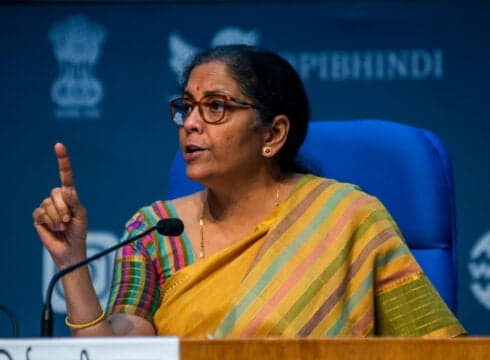The exchange of information between countries helps the resident’s nation to verify tax returns and detect any tax evasion instances from foreign incomes of the taxpayer
Since crypto is a hotbed for scams and tax evasion due to its decentralised and layered nature, FM has suggested that the asset be brought into the ambit of information exchange
Sitharaman pointed out that G20 nations need to play the role of catalyst in enhancing transparency in other non-financial assets, including crypto
Inc42 Daily Brief
Stay Ahead With Daily News & Analysis on India’s Tech & Startup Economy
Finance Minister Nirmala Sitharaman suggested that the G20 nations also bring non-financial assets such as crypto and immovable properties under the purview of automatic exchange of information among countries.
Sitharaman stated that investigations show that layers of entities are often created to evade taxes and conceal unaccounted assets. To enhance tax transparency, the FM, during the G20 Ministerial Symposium on Tax and Development, in Bali, stated that India wishes to gather a global strategy around cryptos for their effective regulation.
Since tax evaders explore other avenues to shift their unaccounted wealth through investment in non-financial assets, Sitharaman pointed out that G20 nations need to play the role of catalyst in enhancing transparency against cryptocurrencies’ decentralised nature.
“While the development of crypto asset reporting framework is underway, I call upon the G20 to examine the feasibility of an automatic exchange of information in respect of other non-financial assets beyond those covered under the Common Reporting Standards (CRS) like immovable properties as well,” she said.
For the uninitiated, Automatic Exchange of Information (AEOI) is a systematic and periodic collection and transmission of ‘bulk’ taxpayer information by the source country to the country of residence of the taxpayer, without the latter having to make a request for the same.
The exchange of information by way of AEOI is permitted under the provisions of Double Taxation Avoidance Agreements (DTAAs) helping the residence nation to verify tax returns and detect any tax evasion instances. Over 95 countries are a part of India’s AEOI relationship.
It is to be noted that since the advent of the blockchain phenomenon called cryptocurrency, it has been linked to crypto cybercrimes such as ransomware attacks, money laundering and more.
Due to its decentralised nature, crypto transactions also can happen without any identification with the internet protocol addresses of users as the only available information. This can lead to a huge amount of transfer over blockchain, without revealing the identity of the source transferer, a hotbed for scamsters and black money owners.
The Indian government is tightening the law around the taxation of cryptocurrencies. Thus, it is likely the collaborative approach between nations over other taxable incomes of Indian residents from foreign countries will duplicate over other non-financial assets and even crypto.
Currently, the Indian government has imposed 1% TDS on crypto transactions and a 30% tax on income from crypto. The Centre is also in conversation with the GST Council on classifying cryptocurrency as goods or services to bring it under the ambit of the indirect tax law. It is planning to levy tax on the entire value of transactions.
The crypto tax, criticised by many, in its present form has come into effect from April 1, 2022.
{{#name}}{{name}}{{/name}}{{^name}}-{{/name}}
{{#description}}{{description}}...{{/description}}{{^description}}-{{/description}}
Note: We at Inc42 take our ethics very seriously. More information about it can be found here.


